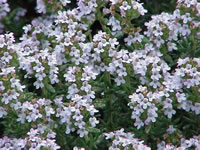Thymus vulgaris
English: Thyme
Sanskrit/Indian: Banajwain
Russian: Тимьян обыкновенный

General information:
Thyme is a hardy perennial shrub, 20-40 cm high, the dried leaves are curled, brownish green colour, 6.7 mm long, marketed in whole or ground form. The flavour is aromatic, warm and pungent. Flowers are light violet, two lipid, 5mm long, with hairy glandular calyx. The major types of thyme available in the international market are French Thyme, Spanish Thyme and American Thyme. Thyme is a native to Southern Europe from Spain to Italy. Apart from Europe it is grown in Australia, North Asia, North Africa, Canada and USA. In India, it is cultivated in the Western temperate Himalayas and Nilgiris.
Constituents:
The main chemical components are a-thujone, a-pinene, camphene, b-pinene, p-cymene, a-terpinene, linalool, borneol, b-caryophyllene, thymol and carvacrol.
Benefits:
- Common thyme has a very long history of folk use for a wide range of ailments. It is very rich in essential oils and these are the active ingredients responsible for most of the medicinal properties. In particular, thyme is valued for its antiseptic and antioxidant properties, it is an excellent tonic and is used in treating respiratory diseases and a variety of other ailments. The flowering tops are anthelmintic, strongly antiseptic, antispasmodic, carminative, deodorant, diaphoretic, disinfectant, expectorant, sedative and tonic. The plant is used internally in the treatment of dry coughs, whooping cough, bronchitis, bronchial catarrh, asthma, laryngitis, indigestion, gastritis and diarrhoea and enuresis in children. Internal intake should not be prescribed for pregnant women. Externally, it is used in the treatment of tonsillitis, gum diseases, rheumatism, arthritis and fungal infections. The plant can be used fresh at any time of the year, or it can be harvested as it comes into flower and either be distilled for the oil or dried for later use. Thyme has an antioxidant effect, thus regular use of this herb improves the health and longevity of individual body cells and therefore prolongs the life of the body. The essential oil is strongly antiseptic. The whole herb is used in the treatment of digestive disorders, sore throats, fevers etc. The essential oil is one of the most important oils used in aromatherapy. Its keyword is 'Bacterial'. It is used especially in cases of exhaustion, depression, upper respiratory tract infections, skin and scalp complaints etc.
